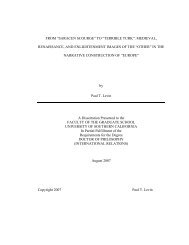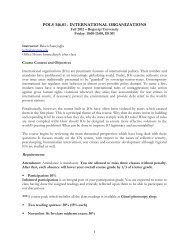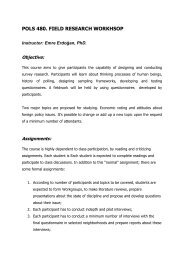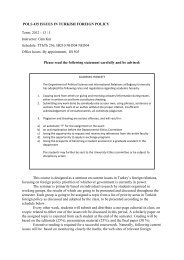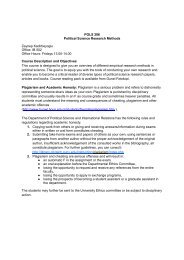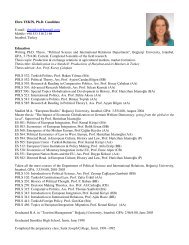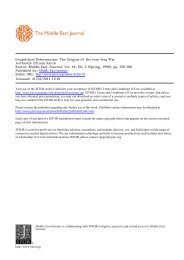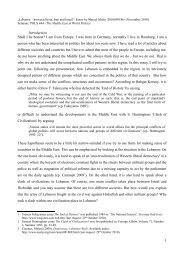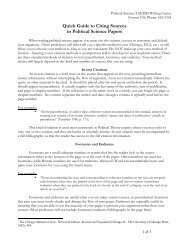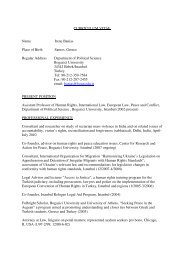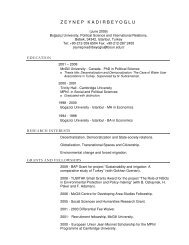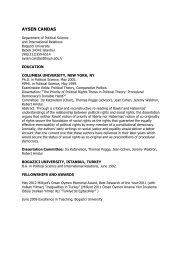POLS 201 History of Political Thought I - Department of Political ...
POLS 201 History of Political Thought I - Department of Political ...
POLS 201 History of Political Thought I - Department of Political ...
Create successful ePaper yourself
Turn your PDF publications into a flip-book with our unique Google optimized e-Paper software.
<strong>POLS</strong> <strong>201</strong> <strong>History</strong> <strong>of</strong> <strong>Political</strong> <strong>Thought</strong> I<br />
Fall <strong>201</strong>2<br />
SYLLABUS<br />
<strong>Department</strong> <strong>of</strong> <strong>Political</strong> Science and International Relations<br />
Bogazici University<br />
Instructor: Dr. Ayşen Candaş Bilgen<br />
e-mail: aysen.bilgen@boun.edu.tr<br />
phone: (212) 359-6514<br />
Lectures: TTTh 565<br />
Office hours: by appointment through e-mail<br />
Course Description<br />
This course focuses on the seminal texts <strong>of</strong> the Western <strong>Political</strong> <strong>Thought</strong> such as<br />
Plato’s Republic, Aristotle’s Nicomachaen Ethics and Politics, Augustine’s City <strong>of</strong> God and<br />
Aquinas’ Summa Theologica. We will cover the Ancient, Roman and Medieval Ages and<br />
various schools <strong>of</strong> thought that have become influential during these periods. The texts<br />
we will study document the ‘debates’ between their authors who frequently responded<br />
to each other across centuries in defining “the political,” “political society,” “political<br />
rule,” “law,” “nomos,” “citizen,” “freedom,” “equality,” “justice,” “democracy,” “rule <strong>of</strong><br />
law” and the like.<br />
The texts contain the earliest expressions <strong>of</strong> major political concepts, ideas and<br />
ideals that are not likely to lose their relevance and validity. They also carry the imprint<br />
<strong>of</strong> the historical context in which they were written: these were responses and<br />
challenges to the prevalent modes <strong>of</strong> thinking that existed then, in that particular<br />
moment in history. The texts that explore the meaning <strong>of</strong> “the political” and “the goals<br />
<strong>of</strong> political association” entail and claim to entail new and better ways <strong>of</strong> perceiving and<br />
attributing meaning to and transforming the social and political context: they are<br />
instances <strong>of</strong> political theory and as such they contain essentially normative and political<br />
material. They almost always come up with prescriptions for overcoming the critical<br />
problems and questions that capture that particular time frame in which they came into<br />
being. Each thinker -and school <strong>of</strong> thought- we will study has influenced the thoughts <strong>of</strong><br />
the next generation(s) in ways that in turn changed the course <strong>of</strong> their thinking, and<br />
their interpretation <strong>of</strong> their own conditions and problems. Yet the influence exerted<br />
upon the later generations did not remain confined to the history <strong>of</strong> political ideas;<br />
these influences, if and when popularized, were also <strong>of</strong>ten capable <strong>of</strong> changing the very<br />
course <strong>of</strong> history. We will do conceptual analysis when we focus on the definitions with<br />
their components and their substance. We will do historical analysis when we interpret<br />
the rise <strong>of</strong> a particular conception in relation to the time frame in which it came into<br />
being.<br />
<strong>POLS</strong> <strong>201</strong> Syllabus Aysen Candas Fall <strong>201</strong>2 Page 1
Course Requirements<br />
Students should attend all sessions. The required readings must be completed<br />
before classes. Bringing the reading assignment to the class is recommended for it is<br />
very likely that we would focus on some specific parts <strong>of</strong> the texts during the lectures.<br />
Class participation is highly desirable for only further discussion would enable us to<br />
probe deeper into these interesting texts and debates. Class participation counts for<br />
10% <strong>of</strong> your final grade.<br />
The course pack is available at Gunel Copy.<br />
I urge you to read the primary texts. It is important that you “hear” the voices <strong>of</strong><br />
the authors instead <strong>of</strong> reading only the interpretations <strong>of</strong> their works written by other<br />
people. Do not read secondary material for this course, it is far more important to read<br />
Aristotle than reading somebody’s opinions on Aristotle. Dare to read the primary<br />
sources, dare to think and form your own opinions!<br />
If you have access to the Internet, I recommend that you have a look at the<br />
classics and philosophy pages. If you are interested in this option I can consider<br />
circulating a list <strong>of</strong> the reliable addresses on the Internet. Yes, there are reliable and<br />
unreliable sources <strong>of</strong> information and the Internet sources can be particularly<br />
vulnerable in terms <strong>of</strong> their reliability. Therefore exercise caution. A safe bet would be<br />
to use the Internet for downloading the primary texts (for example, Plato’s Gorgias,<br />
Cicero’s De Legibus or On Laws) instead <strong>of</strong> secondary texts (for example, Ralph’s take on<br />
Plato, Hans’s interpretation <strong>of</strong> Aristotle’s Politics, an anonymous undergrad’s paper on<br />
Machiavelli). A starting point would be http://www.philosophypages.com/links.htm<br />
Downloading parts <strong>of</strong> a text from the Internet and using it as if it is your own is<br />
plagiarism. You must cite your sources. Plagiarism, if caught, will lead you to get an F<br />
from that assignment. Our department has tightened its rules regarding plagiarism,<br />
hence those who plagiarize, or copy in exams, or download a text and write their name<br />
on it are sent to the disciplinary committee. If you are ever sent to the disciplinary<br />
committee, this fact would always be in your record and would prevent you from being<br />
eligible for certain jobs.<br />
There are two formal requirements for this class:<br />
Midterm exam: short essay format. (40%)<br />
Final exam: short essay format and will cover all that we studied (%50 <strong>of</strong> your<br />
grade).<br />
Class attendance and participation: (10%)<br />
The exam questions will be similar to the questions that we would discuss during the<br />
course <strong>of</strong> the semester.<br />
<strong>POLS</strong> <strong>201</strong> Syllabus Aysen Candas Fall <strong>201</strong>2 Page 2
PART I Ancient and Medieval <strong>Political</strong> <strong>Thought</strong><br />
Preliminary Schedule <strong>of</strong> Topics and Readings<br />
Week 1<br />
Introduction<br />
Social, political and economic context <strong>of</strong> Ancient Greek city states<br />
Demos based on exclusion<br />
Pre-Socratics and Sophists<br />
Socratic method / Plato’s dialogue form<br />
Socrates the Mentor <strong>of</strong> Plato<br />
Philosopher as social critic and ‘enemy <strong>of</strong> the public’<br />
READ: Plato’s Apology, Crito, Phaedo (Classics book, Morgan ed)<br />
Recommended:<br />
Finley, MI. “The Freedom <strong>of</strong> the Citizen in the Greek World,” in Economy and Society in<br />
Ancient Greece, 1981.<br />
Wolin, Sheldon. Politics and Vision, “<strong>Political</strong> Philosophy and Philosophy,” ch. 1<br />
Pojman, Louis. Classics <strong>of</strong> Philosophy, “The Pre-Socratics,” ch. 1<br />
Recommended literature (summer reading?):<br />
Henrik Ibsen, An Enemy <strong>of</strong> the People, online version can be found at:<br />
http://www.classicreader.com/book/1535/<br />
Sophocles, The Theban Plays: King Oedipus; Oedipus at Colonus; Antigone<br />
Week 2<br />
READ: Plato, Republic Book 1, 2 (this year I will use Cornford’s translation, in the<br />
coursepack), pp. 2,7-40, 41-69, 76-118.<br />
Republic: What justifies the ruler-ruled relationship? What gives legitimacy to political<br />
rule?<br />
Plato: Might (power/strength) or Arete? What is the particular kind <strong>of</strong> knowledge<br />
relevant to ruling the Republic?<br />
Thrasymachus vs. Socrates: Might makes right?<br />
Recommended:<br />
Dahrendorf, Ralf. 1968 “In Praise <strong>of</strong> Thrasymachus” in Essays in the Theory <strong>of</strong> Society<br />
Week 3<br />
Republic, Book 3, 4, 5, 6 , pp. 119-157, 175-200, 205-230, 250-259.<br />
Microcosm / Macrocosm (Organic) analogy<br />
<strong>POLS</strong> <strong>201</strong> Syllabus Aysen Candas Fall <strong>201</strong>2 Page 3
Duties and education <strong>of</strong> different classes<br />
One person one task<br />
The “noble lie”<br />
Equality <strong>of</strong> the sexes, abolition <strong>of</strong> slavery / Opinion vs. knowledge<br />
Theory <strong>of</strong> Forms / Critique <strong>of</strong> sophists<br />
Philosopher King / Cave analogy<br />
Week 4<br />
Deterioration <strong>of</strong> regimes / Tyrannical man / Tyrannical City<br />
“Beneficial” poetry<br />
Republic, Book 7, 8, 9, 10, pp. 264-297, 301-305, 315-326, 341-359.<br />
Recommended:<br />
Arendt, “Truth and Politics,” in Laslett<br />
George Sabine, A <strong>History</strong> <strong>of</strong> <strong>Political</strong> Theory, ch. 4<br />
Wolin, “Plato: <strong>Political</strong> Philosophy versus Politics,” ch.2<br />
Highly recommended:<br />
George Orwell, 1984.<br />
If you cannot find a hardcopy, here is the online version:<br />
http://www.online-literature.com/orwell/1984<br />
Week 5<br />
Aristotle<br />
Happiness as a universal end-in-itself<br />
Virtues and the Golden Mean<br />
Politics as science<br />
On Property Acquisition vs. Wealth Acquisition<br />
<strong>Political</strong> constitution as community-building<br />
Aristotle’s Critique <strong>of</strong> Plato (and Socrates)<br />
Nicomachaen Ethics (David Ross translation, Oxford), pp. 1-63.<br />
Politics, Book 1, 2 (Ernest Barker translation, Oxford), pp. 7-56<br />
Week 6<br />
Definition <strong>of</strong> “the citizen”<br />
Private vs. public virtue<br />
Nature <strong>of</strong> the “political” rule<br />
Competency and citizenship<br />
Kinds <strong>of</strong> constitutions<br />
Three “correct” constitutions and three deviations<br />
Science <strong>of</strong> statesmanship<br />
Politics, Book 3, 4, pp. 84-119<br />
Week 7<br />
<strong>POLS</strong> <strong>201</strong> Syllabus Aysen Candas Fall <strong>201</strong>2 Page 4
Justice, political justice and proportional justice<br />
Property and citizenship / Democracy and equality<br />
Fifth constitution: Politeia (polity): oligarchy +democracy<br />
Five “devices used in constitutions to deceive the people” (Book 4, ch. 13, 1296b §15, p.<br />
165)<br />
Happy citizen / Happy city-state?<br />
“Nature, habit and reason” and their impact on human excellence or perfectibility<br />
Politics pp. 135-178, 229-260.<br />
Week 8<br />
Self-sufficiency as a Moral Ideal: Epicureans, Skeptics, Cynics and Stoics<br />
Epicurians: Epicurus: morality vs. politics<br />
Greek and Roman Stoics: Epictetus, Cicero, Seneca, Diogenes, Marcus Aurelius<br />
Skeptics<br />
Recommended:<br />
George Sabine, A <strong>History</strong> <strong>of</strong> <strong>Political</strong> Theory, ch. 7, 8<br />
Polybius, Cicero<br />
Roman Lawyers<br />
http://oll.libertyfund.org/Home3/Set.php?recordID=0044<br />
http://www.fordham.edu/halsall/ancient/cicero-laws1.html<br />
http://www.fordham.edu/halsall/ancient/polybius6.html<br />
Cicero, On the Commonwealth and the Laws, Cambridge edition, Zetzel ed.), pp. 1-7, 18-<br />
31, 46-49, 51, 56-58, 61-72, 112-118.<br />
Recommended:<br />
George Sabine, A <strong>History</strong> <strong>of</strong> <strong>Political</strong> Theory, ch. 9, 10<br />
Strauss and Cropsey, eds., <strong>History</strong> <strong>of</strong> <strong>Political</strong> Philosophy, “Marcus Tullius Cicero”<br />
<strong>Political</strong> Philosophy: The Search for Humanity and Order, “The Hellenistic Age and the<br />
Roman Lawyers,” ch. 3<br />
Week 9<br />
St Augustine<br />
City <strong>of</strong> God vs. Babylon<br />
Free Will vs. Predestination<br />
The Confessions<br />
http://www.stoa.org/hippo/comm.html<br />
Augustine, City <strong>of</strong> God, (on free will) pp. 152-158, 479-482, 676-683, 693-696.<br />
Recommended:<br />
Sabine, A <strong>History</strong> <strong>of</strong> <strong>Political</strong> Theory, ch. 13<br />
Faith vs. Reason<br />
Secular authority vs. Papal power<br />
<strong>POLS</strong> <strong>201</strong> Syllabus Aysen Candas Fall <strong>201</strong>2 Page 5
St. Thomas Aquinas, On Kingship, Summa Theologica<br />
Aquinas, <strong>Political</strong> Texts, Cambridge, R. W. Dyson ed. included in the coursepack, pp. 83-<br />
93, 96-131, 137-164, 168-191.<br />
Law, varieties <strong>of</strong> law, Justice and the public good.<br />
Recommended :<br />
Maimonides:<br />
http://www.sacred-texts.com/jud/gfp/index.htm<br />
Ibn-i Rust or Averroes:<br />
http://www.muslimphilosophy.com/ir/tt/index.html<br />
http://www.muslimphilosophy.com/ip/rep/H003.htm<br />
Week 10<br />
Dante and the Renaissance<br />
For Dante’s works, see:<br />
http://dante.ilt.columbia.edu/new/library/index.html<br />
http://dante.ilt.columbia.edu/new/comedy/index.html (not in the course pack)<br />
For Dante’s political ideas, four articles, included in the coursepack:<br />
ALBERT L. GUERARD (1921) DANTE AND THE RENAISSANCE<br />
ROBERT G . CALDWELL THE POLITICAL WRITINGS OF DANTE<br />
Herbert Weisinger (Oct., 1945) Ideas <strong>of</strong> <strong>History</strong> During the Renaissance, Journal <strong>of</strong> the<br />
<strong>History</strong> <strong>of</strong> Ideas, Vol. 6, No. 4 pp. 415-435<br />
John Canaday, Portfolio II: The Artist as a Social Critic, pp. 7-12.<br />
Week 11<br />
Marsilius <strong>of</strong> Padua and William <strong>of</strong> Ockham<br />
http://www.fordham.edu/halsall/source/marsiglio4.html<br />
http://www.britac.ac.uk/pubs/dialogus/polth.html (both are included in the<br />
coursepack)<br />
Recommended:<br />
Sabine, ch. 15<br />
Louis Pojman, Classics <strong>of</strong> Philosophy, “William <strong>of</strong> Ockham” c. 13<br />
Wolin, “The Age <strong>of</strong> Empire: Space and Community,” ch. 3<br />
Week 12<br />
Review or the material that we have not yet covered.<br />
Final Exam<br />
<strong>POLS</strong> <strong>201</strong> Syllabus Aysen Candas Fall <strong>201</strong>2 Page 6



